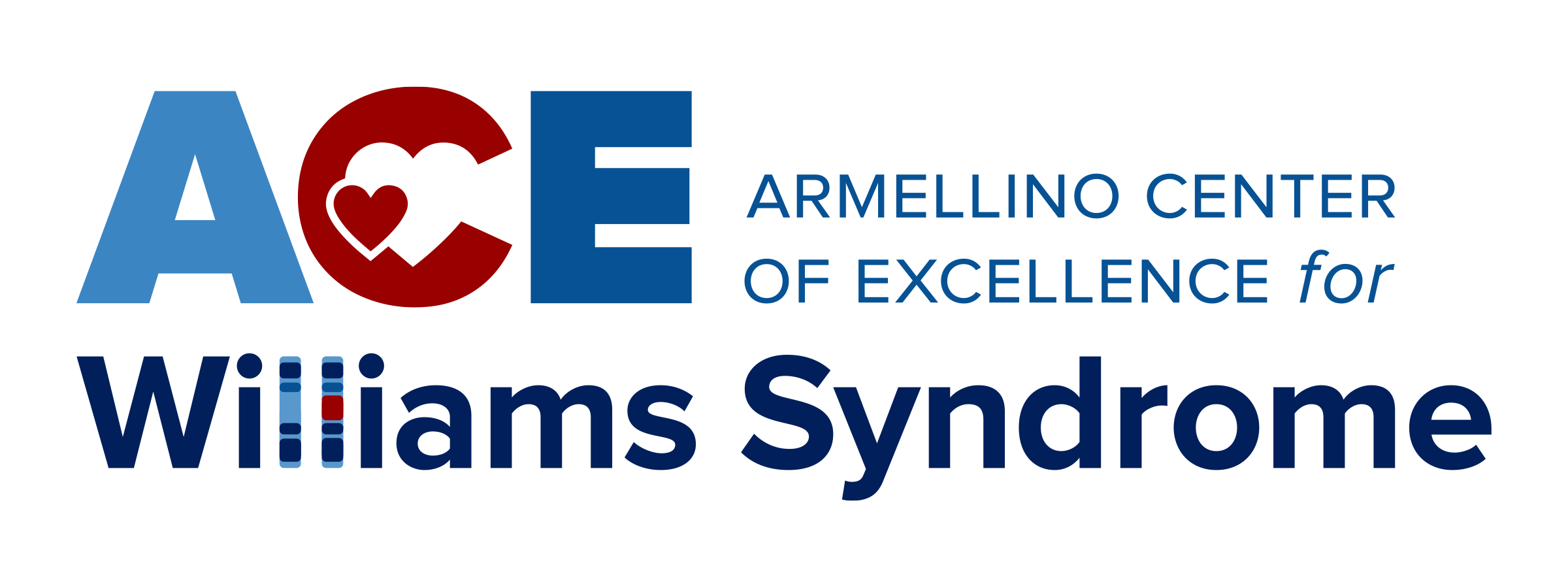International Conference on Research in Williams Syndrome
September 29-30, 2025
Location
The Study at University City
Book your stay here.
Schedule
Monday, September 29th:
Session |
Title |
Speaker |
| Welcome | Welcome from ACE-WS |
Jocelyn Krebs, PhD Director, ACE-WS |
|
Dan Rader, MD ACE-WS |
||
| Plenary Session: Williams syndrome research, past and future | Adults with Williams syndrome: "The more I learn, the more I realize I don't know." |
Barbara Pober, MD Massachusetts General Hospital |
| Genetics of Williams syndrome |
Paige Kaplan, MD Children's Hospital of Philadelphia |
|
| Voices of the WS Community |
Brendan Lemieux Williams Syndrome Association |
|
| Introduction to WSA Clinical Consortium and CReWS |
Sarah Schaefer Director of WSA |
|
|
Wendy Chung, MD, PhD Boston Children's Hospital |
||
| Lunch and Lunchtime Interest Groups | Wet Lab Tools: Joining Forces in Creating Resources |
Daria Fleyshman, PhD ACE-WS |
| Outcome Measures in WS: Behavior and Cognition |
Edward Brodkin, MD ACE-WS |
|
| Session 1: Brain and Cognition | Williams Syndrome Offers a Rare and Precious View of the Path from Genes to Neural Circuits to Behavior & Back Again |
Karen Berman, MD National Institute of Mental Health |
| From gene to therapy: Gtf2i, myelination, and brain development in Williams syndrome |
Boaz Barak, PhD Tel-Aviv University |
|
| Novel Multimodal Neuroimaging Reveals Differences in Circuit-Level Brain Features in Williams Syndrome Associated with Social and Visuospatial Functions |
Madeline Garvey National Institute of Mental Health |
|
| Cerebral White Matter Lesions in Adults with Williams Syndrome: A Pilot FLAIR MRI Study |
Ya-Chin Chen, PhD Massachusetts General Hospital |
|
| Neuronal and Non-neuronal Expression of Select Genes in the 7q11.23 Williams Syndrome Critical Region in Human Cerebral Cortex |
Michael J. Iadarola, PhD National Institute of Mental Health |
|
| Coffee Break | ||
| Session 2: Cardiovascular function, aging, and mouse models | Cardiovascular disease in Williams Syndrome: Human data and animal model insights |
Mark Levin, MD ACE-WS |
| Who, what, when—therapeutics for elastin insufficiency in Williams syndrome |
Beth Kozel, MD, Ph.D Nationwide Children’s Hospital |
|
| Regulation of Elastin transcription- Insights from Patients with SVAS |
Sara Procknow, MD/PhD St Louis Children’s Hospital, Washington University in St Louis School of Medicine |
|
| Cardiovascular Effects of Pediatric-Dose Allopurinol and Losartan in a Murine Model of Williams-Beuren Syndrome: A Comparative Study |
Alba Aizpuru-Gómez Universitat de Barcelona |
|
| Premature Aging in Williams-Beuren Syndrome: Neural and Cardiovascular Insights from a Murine Model |
Jana Ruiz Castro Universitat de Barcelona |
|
| Poster session | Appetizers and drinks served | |
Tuesday, September 30th
Session |
Title |
Speaker |
| Session 3: Behavioral Health | Assessment and Treatment of Anxiety in Williams Syndrome |
Robyn Thom, MD Massachusetts General Hospital |
| Efficacy of Play- and Humor-Infused Gradual Exposure Therapy for Young Children with Williams Syndrome |
Bonita Klein Tasman, PhD University of Wisconsin: Milwaukee |
|
| Community-Engaged Development of the Distance-Delivered Social Skills Training Program for Adults with Williams Syndrome |
Marisa Fisher, PhD Michigan State University |
|
| Exploring Depression Among Adults with Williams Syndrome |
Elizabeth Liffley Michigan State University |
|
| Lunch and Lunchtime Interest Groups | Therapy in Williams syndrome: PT, OT and Speech |
Kristen Kouvel, PT, DPT, PCS, CPMT; Anne Ashley Field, OTR/L, BCP; Emily Scott, OTR/L, IBCLC; Makaela Somma, M.S., CCC-SLP ACE-WS |
| Topic TBD | ||
| Session 4: Development, education and executive functioning | Children and Adolescents with Williams Syndrome: Language and Literacy |
Carolyn Mervis, PhD ACE-WS |
| Potential treatment targets to improve daily living skills during the transition to adulthood |
Benjamin Yerys, PhD ACE-WS |
|
| Personality Traits and Neural Substrates Across Development in Williams Syndrome and 7q11.23 Duplication Syndrome |
Darby Krugel National Institute of Mental Health |
|
| Mastery Motivation in Young Children with Williams Syndrome or Down Syndrome |
Caroline G. Richter, PhD University of Alabama at Birmingham |
|
| Cognitive Ability Patterns of Older Children and Adolescents with Williams Syndrome |
Vitor Neves Guimaraes, PhD ACE-WS |
|
| Coffee Break | ||
| Session 5: Community Engaged and Community-Based Participatory Research | Community-Based Participatory Research Model: Application to Racially Marginalized Individuals with Williams Syndrome and Their Families |
Brianna Young, PhD Kennedy Krieger Institute/ Johns Hopkins University School of Medicine |
| Centering families in science: A novel methodology to identify research priorities in Williams syndrome |
Naama Harari-Uzan, MS Tel-Aviv University |
|
| Patient-centered research agendas: Panel discussion | Panel moderated by Brendan Lemieux | |
| Closing Remarks | ||
Registration
| General Registration | $150 |
| Penn Medicine & CHOP Faculty/Clinicians | $50 |
| Industry Representatives | $500 |
| Students, Post-docs, ACE-WS Staff, & WSA Staff | Free (registration is still required) |
Note: As this is a CME-accredited meeting, you’ll be prompted to create a profile with the University of Pennsylvania. Please follow the instructions provided during registration. CME credits are available for eligible participants.
Please register here.
Abstracts
Interested in presenting? Early submission is encouraged as speaker slots are limited.
Submit your abstract or poster here.
For questions, please contact us at ace-ws-research@pennmedicine.upenn.edu





